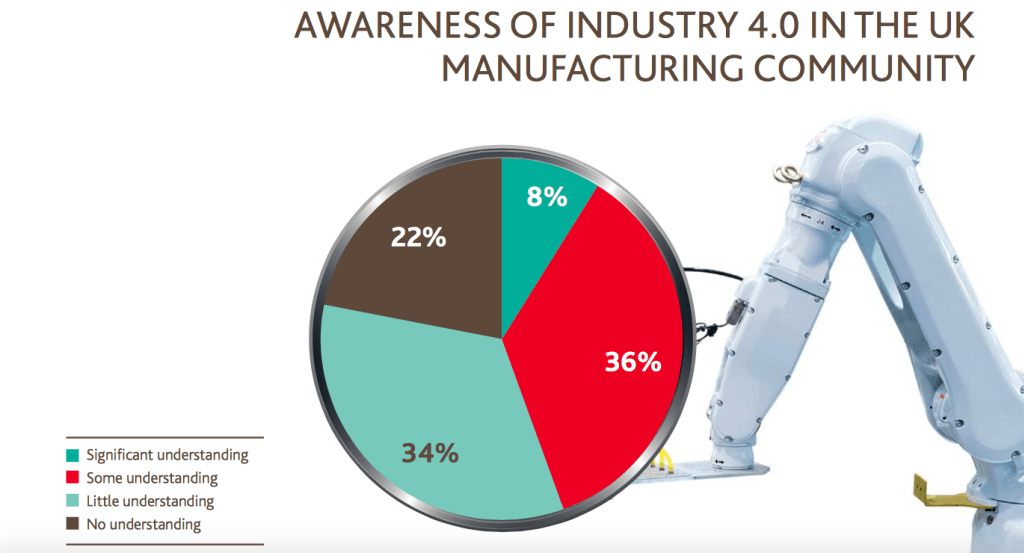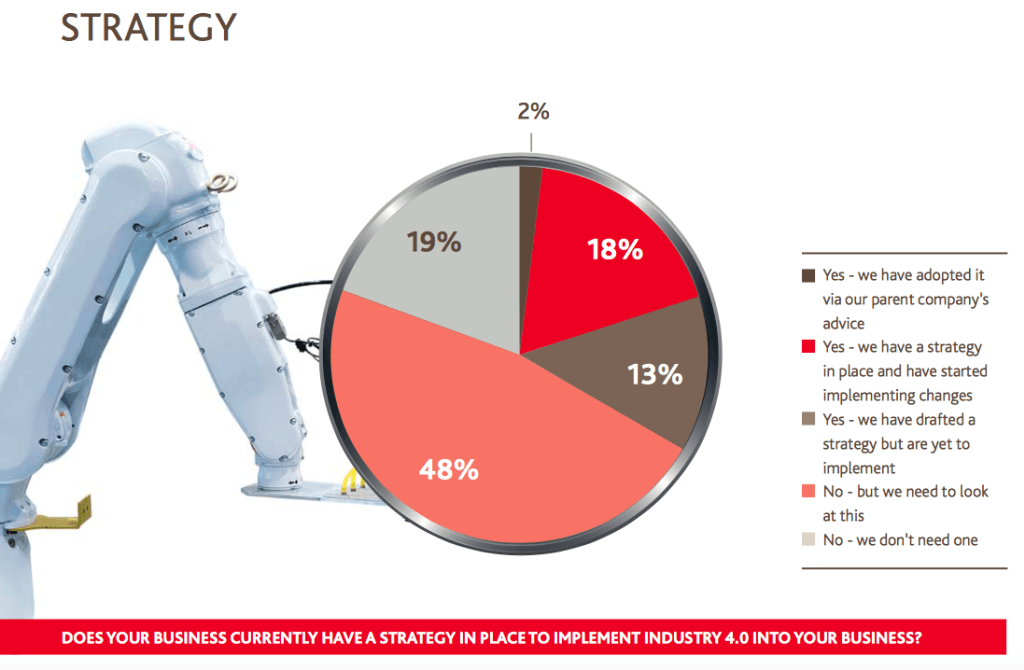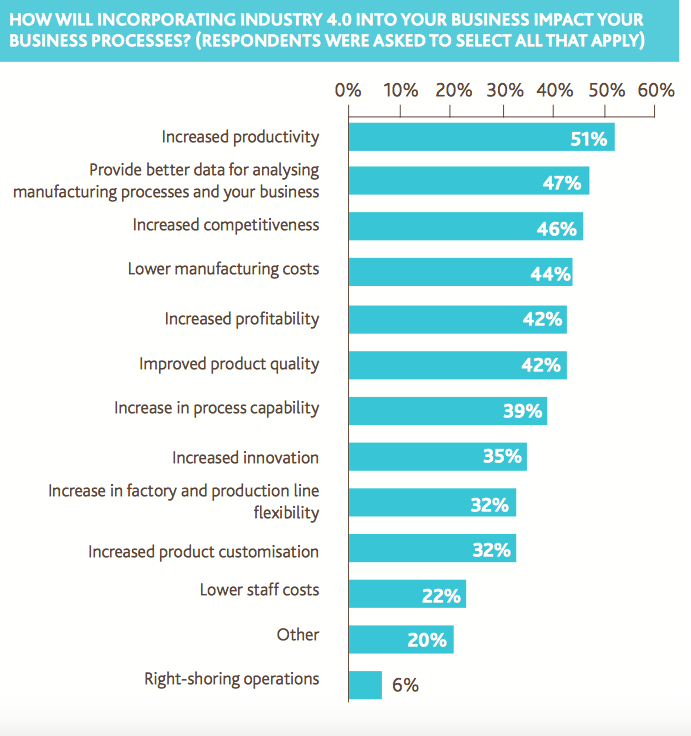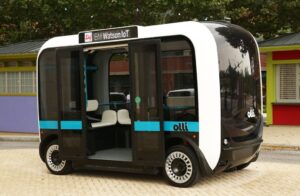UK manufacturers lack understanding of Industry 4.0, a new survey found. This could put UK manufacturing at risk of being left behind as other countries embrace Industry 4.0.
While a majority of UK manufacturers (59 percent) recognize that Industry 4.0 will have a big impact on the UK manufacturing sector, only a minority (8 percent) say they have a significant understanding of the term Industry 4.0, according to a new report by BDO and the Institution of Mechanical Engineers (IMechE). “It is surprising to see such low awareness of Industry 4.0 amongst UK manufacturers and clearly more needs to be done to educate, support and assist the sector as we make strides into what is likely to become the fourth industrial revolution,” said Tom Lawton, head of Manufacturing at BDO. ”UK manufacturers need to push ahead or they will be left behind, especially when it is evident other countries are already moving ahead of the game with education and investment programmes being much more clearly supported by government than in the UK.”

Nearly half of UK manufacturers lack Industry 4.0 strategy
Among surveyed companies, 48 percent state they have no Industry 4.0 strategy but need to look into it. Another 19 percent say they do not need an Industry 4.0 strategy. However, despite the stated lack of Industry 4.0 strategy, 43 percent say they plan some level of investment in automation over the next 24 months, while 10 precent plan to invest £1m (nearly $1.5 million) or more in this technology. Among companies planning to increase their investment in Industry 4.0, 16 percent expect to spend over £500,000 (over $713,000) before 2018 and 7 percent more than £5m (over $7 million).

Production is there a key area of investment, followed by research and development and logistics. Among those not investing in Industry 4.0, 44 percent cite a lack of understanding as the main reason for not currently investing. “The survey findings show that much more is needed to be done to help our manufacturers understand how technologies such as automation can add value to their businesses. By embracing this new revolution our factories will become much more intelligent, be able to detect and even predict faults in our production lines before they happen. This will not only lead to increases in efficiency and productivity but also drive out waste improving our global competitiveness,” said Philippa Oldham, head of manufacturing at the IMEchE.
Productivity main area affected by Industry 4.0
Increased productivity is the main area where Industry 4.0 will affect UK manufacturing, followed by data analysis, increased competitiveness and lower manufacturing costs. Furthermore, a majority of UK manufacturers (52 percent) state they have some of the right skilled people to implement Industry 4.0 into their business, while 17 percent say they do not have the right skilled people.

BDO and the IMEchE are now calling for the UK government to step in and do more to educate about the benefits of Industry 4.0 and the risks of not embracing the fourth industrial revolution. “The lack of a clear strategy on what could be the most important development in manufacturing for some years is of huge concern. We would like to see the Government doing more to match manufacturers’ long-term outlook by developing a 15-20 years industrial policy that avoids the disruptions of the political cycle,” said Tom Lawton, Head of Manufacturing at BDO LLP.
IIoT News Recap: Local Motors presents Watson-powered self-driving shuttle Olli; Telia Sweden to push NB-IoT with Ericsson, Nokia and Intel; Montréal announces $77 million smart city startup fund; Weightless partners with ETSI on LPWAN standards development; Keysight and National Applied Research Laboratories sign MOU on 5G R&D; Industrial IoT startup DeepSense raises $2 million

Autonomous driving: Local Motors presents Watson-powered self-driving shuttle Olli
3D printed car manufacturer Local Motors has announced Olli, the first self-driving vehicle to integrate IBM Watson Internet of Things (IoT) for Automotive. The electric vehicle can carry up to 12 people and will be used on public roads locally in DC, and later on in 2016 in Miami-Dade County and Las Vegas. “Olli offers a smart, safe and sustainable transportation solution that is long overdue,” said Local Motors CEO and co-founder John B. Rogers. “Olli with Watson acts as our entry into the world of self-driving vehicles, something we’ve been quietly working on with our co-creative community for the past year. We are now ready to accelerate the adoption of this technology and apply it to nearly every vehicle in our current portfolio and those in the very near future. I’m thrilled to see what our open community will do with the latest in advanced vehicle technology.” Olli will use IBM Watson’s cloud-based cognitive computing capability to analyze and learn from high volumes of transportation data produced by more than 30 sensors embedded throughout the vehicle, the company explained.
NB-IoT: Telia Sweden to push NB-IoT with Ericsson, Nokia and Intel
Telia announced a cooperation between the operator, Ericsson, Nokia and Intel to develop the standard for Narrow-Band Internet of Things (NB-IoT). Telia expects to market NB-IoT compliant products during 2017.
Smart city: Montréal announces $77 million smart city startup fund
The Mayor of Montréal, Denis Coderre, and the Minister of Municipal Affairs and Land Occupancy and Minister responsible for the Montréal region, Martin Coiteux, announced the creation of Capital Intelligent Mtl, a $77 million (CAD$100 million) startup fund geared towards smart city startups. “The vision and the leadership of the city of Montréal and of the venture capital industry takes shape today in the form of Capital Intelligent Mtl. The message to entrepreneurs is clear: there’s a future in smart cities. I strongly encourage businesses to step up and become international smart city leaders. As President of Metropolis, I will seize every opportunity to invite entrepreneurs from Montreal and elsewhere to submit their projects,” stated Denis Coderre. Capital Intelligent Mtl is comprised of 23 venture capital firms, financial institutions and corporations.
LPWAN: Weightless partners with ETSI on LPWAN standards development
Weightless announced it is partnering with the European Telecommunications Standards Institute (ETSI) on LPWAN standardization by contributing its Weightless-N standards activities to the ETSI Low Throughput Network (LTN) initiative. “In order to reduce fragmentation and enable critical mass in the marketplace we are bringing these two initiatives together, immediately reducing fragmentation and providing a platform around which industry can coalesce,” said Weightless CEO, Professor William Webb.
5G: Keysight and National Applied Research Laboratories sign MOU on 5G R&D
Keysight Technologies and National Applied Research Laboratories (NAR Labs) announced they signed a memorandum of understanding (MOU) aimed at establishing a strategic partnership on research and development (R&D) of 5G communication technologies. The collaboration will lead to the launch of the next generation of high-speed broadband mmWave wireless communications experimental networks, the companies stated. “Keysight is actively involved in 5G standards development and is fully committed to innovating the solutions needed to accelerate deployment of the next generation of wireless communications,” said Allen Chang, Keysight Taiwan general manager. “That’s why we are so proud to be collaborating with NAR Labs on 5G communication-link technology. It not only represents a significant advance in the realization of 5G, but also paves the way for future research and development of mmWave communication systems.”
Today’s startup: Industrial IoT startup DeepSense raises $2 million
Industrial IoT startup DeepSense, formerly known as SmartLogic, has raised $2 million in a financing round led by angel fund AfterDox. DeepSense has developed a system that collects large amounts of data from multiple sites at very high speed and streams that data to the cloud in real-time. “The company was founded in order to provide a solution to manufacturers and machine operators which incur great losses from machine failures and unplanned shutdowns,” said Eitan Vesely, CEO. “At this point our main focus is on the energy market – power plants, turbine manufacturers and operation & maintenance companies. Our system is already installed in a power plant in the US, and we are currently in discussions with additional energy providers.” The financing round will be used to expand the company’s R&D team and establish a presence in Europe, Globes reports.

